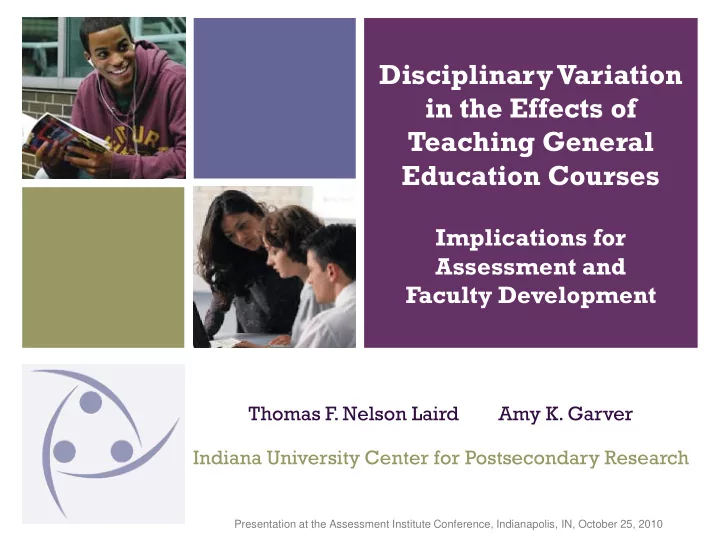

Disciplinary Variation in the Effects of Teaching General Education Courses Implications for Assessment and Faculty Development Thomas F. Nelson Laird Amy K. Garver Indiana University Center for Postsecondary Research Presentation at the Assessment Institute Conference, Indianapolis, IN, October 25, 2010
Overview The college curriculum and liberal learning Defining essential learning outcomes Comparing faculty teaching general education courses (GECs) and those teaching non-GECs by disciplinary area Implications for assessment and faculty development Discussion
College Curriculum 20th Century 21st Century Liberal education A set of courses A set of outcomes What to worry about Taking the right Promoting the right courses outcomes Registration Teaching & learning Control over Greater faculty Greater student responsibility learning responsibility
American Curricular Models No choice – the curriculum was set and assumed to produce liberal learning Free choice – student control leads to concern for the complete loss of a coherent liberal education Mixed choice – general education is seen as the part of the curriculum responsible for liberal learning, but does liberal learning then take a back seat in the major?
State of Liberal Education Prepare students for 21 st century workforce Foster greater civic responsibility Increased focus on specialization Create a common learning experience Rely on GEC to delivery liberal learning outcomes
Essential Learning Outcomes Consensus is emerging within higher education as to the essential learning outcomes (ELOs) for the 21st century See the following AAC&U reports College Learning for the New Global Century (2007) Liberal Education Outcomes: A Preliminary Report on Achievement in College (2005) Taking Responsibility for the Quality of the Baccalaureate Degree (2004) Greater Expectations: A New Vision for Learning as a Nation Goes to College (2002)
Knowledge… …of human cultures and the physical and natural world Through study in the sciences and mathematics, social sciences, humanities, histories, languages and the arts Focused by engagement with big questions, both contemporary and enduring Adapted from AAC&U, 2007, p. 12
Intellectual & Practical Skills Including Inquiry & analysis Quantitative literacy Critical & creative Information literacy thinking Teamwork & problem Written & oral solving communication Practiced extensively, across the curriculum, in the context of progressively more challenging problems, projects, and standards for performance Adapted from AAC&U, 2007, p. 12
Personal & Social Responsibility Including Civic knowledge & engagement--local & global Intercultural knowledge & competence Ethical reasoning & action Foundations & skills for lifelong learning Anchored through active involvement with diverse communities and real-world challenges Adapted from AAC&U, 2007, p. 12
Integrative Learning Including Synthesis and advanced accomplishment across general and specialized studies and the arts Demonstrated through the application of knowledge, skills, and responsibilities to new settings and complex problems Adapted from AAC&U, 2007, p. 12
Findings from the Faculty Survey of Student Engagement
Faculty Survey of Student Engagement A companion survey to the National Survey of Student Engagement (NSSE) started in 2003 Administered each spring to faculty teaching undergraduate courses across the country to assess faculty practices, emphases, and observations Used to bring faculty into the conversation about student engagement and to inform the improvement of undergraduate education Almost 100,000 faculty members from more than 465 colleges and universities have responded to the survey
Past Research Suggests… GECs place greater emphasis on Intellectual skills Individual and social responsibility Deep approaches to learning Non-GECs place greater emphasis on Practical skills Faculty emphasis on these outcomes and practices varies by disciplinary area
Purpose To understand how the gaps between GECs and non-GECs vary by disciplinary area to improve the undergraduate education
For this study… Over 8,000 faculty from 100 U.S. baccalaureate degree- granting institutions Faculty responded about a particular course taught during the current academic term (course-based survey) Sample characteristics Median year taught=14 44% women 60% taught upper div 76% White 27% at private inst 85% full-time 50% taught GEC median course load=5 Approx equal representation by rank
Categorizing Disciplines Biglan’s (1973) categorization is used to group disciplinary areas Hard v Soft Pure v Applied Life v Non-Life 8 resulting categories Soft-Pure-Life (sociology) Hard-Pure-Life (biology) Soft-Pure-Non-Life (history) Hard-Pure-Non-Life (chemistry) Soft-Applied-Life (educ) Hard-Applied-Life (agriculture) Soft-Applied-Non-Life (bus) Hard-Applied-Non-Life (eng)
Measures Intellectual skills ( = 0.60) Practical skills ( = 0.63) Individual & social responsibility ( = 0.82) Emphasis on deep approaches to learning ( = 0.75)
INTELLECTUAL SKILLS Soft-Pure-Non-Life Hard-Applied-Life Soft-Applied-Life Soft-Applied-Non-Life Soft-Pure-Life Hard-Applied-Non-Life Hard-Pure-Non-Life Hard-Pure-Life
PRACTICAL SKILLS Hard-Applied-Non-Life Soft-Applied-Non-Life Hard-Applied-Life Hard-Pure-Non-Life Soft-Applied-Life Hard-Pure-Life Soft-Pure-Non-Life Soft-Pure-Life
INDIVIDUAL & SOCIAL RESPONSIBILITY Soft-Applied-Life Soft-Pure-Non-Life Soft-Pure-Life Hard-Applied-Life Soft-Applied-Non-Life Hard-Pure-Life Hard-Applied-Non-Life Hard-Pure-Non-Life
DEEP APPROACHES TO LEARNING Hard-Applied-Life Soft-Applied-Life Soft-Pure-Non-Life Soft-Pure-Life Soft-Applied-Non-Life Hard-Pure-Life Hard-Applied-Non-Life Hard-Pure-Non-Life
Implications Room for greater emphasis on all essential learning outcomes in courses across course type and field Differences between GECs and non-GEC depend on discipline Results can help feed campus conversations about what outcomes and practices should be emphasized in each part of the curriculum Raises questions about how and whether to approach promoting essential learning outcomes across the curriculum
Campus Questions How are essential learning outcomes (ELOs) and good educational practices defined across campus? How is the curriculum structured to achieve these outcomes? How should different parts of the curriculum work together to promote certain outcomes (e.g. integrative learning)? How are faculty from across disciplinary areas involved in conversations about promoting ELOs? How are faculty changing their teaching to promote ELOs? How are assessment initiatives informing dialogue about ELOs on your campus?
Questions for You Thinking about your own discipline, do you think these outcomes and practices are sufficiently emphasized in general education courses? In non-general education courses? What do you make of the differences between disciplinary clusters in their emphasis on these practices and outcomes? Should the gaps between course types and disciplines be cause for concern? If so, what should be done?
For more information… Feel free to contact us: Tom: tflaird@indiana.edu Amy: agarver@indiana.edu For copies of presentations, handouts, reports, and other materials visit www.nsse.iub.edu www.fsse.iub.edu
Recommend
More recommend